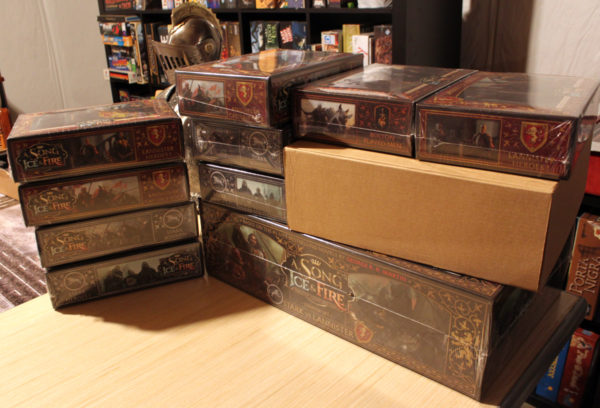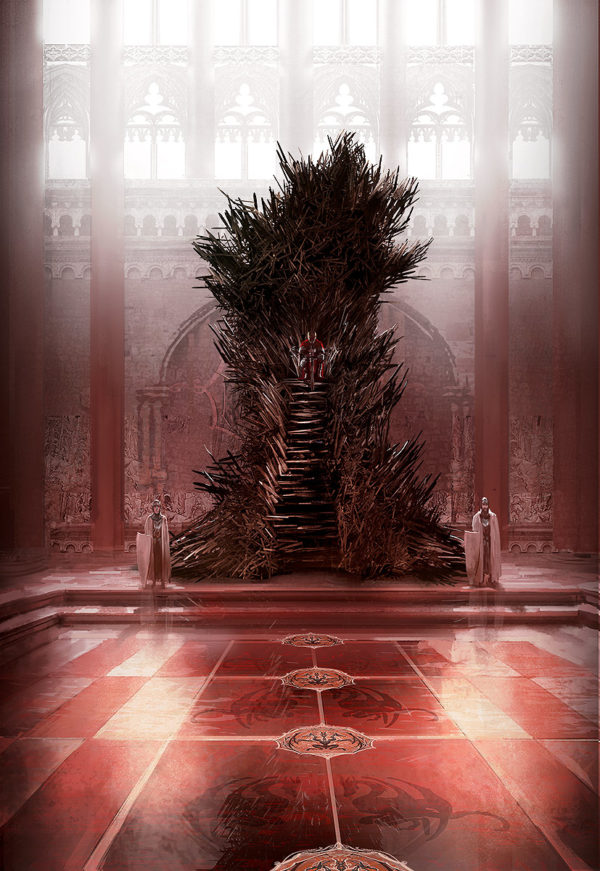Well. After 3+ months, CMON was finally able to ship out the other half of my Song of Ice and Fire Miniatures Game pledge. I hadn’t realized until I saw the shipping notification what effect that botched delivery had on my desire to play the game. Nevertheless, it has arrived.
A Song of Ice & Fire TMG made a nice splash when I first received it shortly before Gen Con but then it only came out that one time. It was unfortunate as we liked the game but then Gen Con hit and things got busy. I was still playing the game at Gen Con though, even through the debacle that was their first tournament attempts. Even though that tournament soured me on pushing for more competitive play at GC, we still had fun running a full game of the Night’s Watch and Free Folk advanced demos.
All-in-all, the game was fun and even though Gen Con was a mixed experience, I still came out of it excited and ready for more. Getting back home, I was reminded that I was still missing half of my Kickstarter pledge and, initially, I thought it would be ok since we still had enough to field armies and play. But games never materialized and my set was mothballed for awhile. I repeatedly bugged CMON on ship dates for the remaining items but every month was the same story about having to wait until after the late pledges were filled. The mind understood but the soul did not.
It seemed petty to ditch the whole game just because of a mix up, especially when we could still fully play it but we just lost all drive to move forward until I got that shipment notice. Then it dawned on me truly why we weren’t playing the game: it takes two to tabletop tango. Even though half my shipment was not provided, we still had a core set and several expansions, not to mention the Hand of the King extras. Correction: I had the core set and several expansions. Or technically my friend could have had them but he said I should keep the first set. See, to save on shipping, my friend and I went in on one order and doubled everything. So while I technically had something we could both play with, my friend didn’t actually have anything of his own until just yesterday when the rest of our stuff arrived.
Having dived into many different tabletop minis games, my friend and I started to realize something- one person can’t source a miniatures game. It just doesn’t work for us. Unlike board games, to get a minis game on the table takes a lot of individual effort. There is the assembling and painting. Then there is learning the rules followed by further understanding your own faction’s rules. Then finally, there is list building. All of these elements can be governed by one person (likely the person owning all the minis) but that only gets you the first taste of the game. It’s like demoing it to your friend. Demos are fine and fun but until your friends also put in the effort to learn the idiosyncrasies of their faction and build their own lists, the game will only be a shadow of its full potential.
It takes two to tabletop tango.
We started to realize this when we get into a new minis game and, with some exceptions, our group typically doesn’t get into a new minis game unless everyone is on board. Without the group, there will be no shared impetus to get the game on the table. No fellow encouragement when assembling or painting your army. No want to develop new and unique armies. I can (and have) built lists for the non-owning player but it typically fails because the developing the build also develops your ability to play that list. Handing that list over to someone else rarely leads to the new player feeling successful in the game (regardless of their win or loss). All too often, the player feels frustrated or confused as to what to do with specific units or combinations of forces. Again, usually not a problem if you are just demoing or running your first game but a big appeal to most gaming experiences is personal growth: developing strategies, understanding the subtle nuances of complex rules’ systems, and learning the flow of the game.
Due to board games’ typical simplicity (when compared to a tabletop miniatures game), one does not need to study the game rules and components. Simply playing the game multiple times will yield the growth that gamers need. Due to the tabletop miniatures game’s complexity and drive to constant asymmetry, the player needs to study the game and its components. This study makes up part of the “lifestyle” aspect of so many of these game systems and helps drive the appeal. If you know that you’ll only see this game (which will cost 10x or more than a normal board game) once a month or often less, it seems highly inefficient to get involved, especially when considering the time and effort it takes just to get the game table-ready. Luckily, these lifestyle games come equipped with a ton of downtime activities and it is those “solo” aspects of the game that will keep players interested even though they aren’t hitting the actual very often.
With the shipment complete and the full game soon to be in my friend’s hands, I’m excited to see the prospect of the game hitting the table again. Time to go make some lists and see if I want to start painting up this monster of plastic and parts. Maybe I’ll even dust off a pimping project idea I had shortly after Gen Con…


